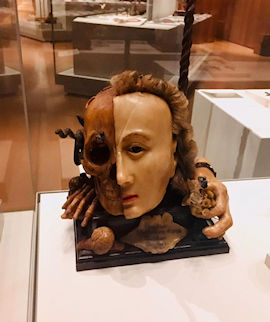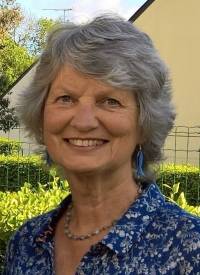Vane Women: The Writers
Lindsay Balderson | Diane Cockburn | S.J. Litherland | Dorothy Long | Marilyn Longstaff | Felicity Manning | Pat Maycroft
Joanna Boulter was a founder member of Vane Women who passed away on September 13, 2019. When ill-health meant that she could no longer take an active role, Joanna was made a lifetime honorary member. This page has a tribute by Annie Wright.

Lindsay Balderson
loves words and the intimate relationships they form with one another. Being a typical Piscean, she has a deep interest in the mystical and magical and these often weave spells in her writing. Born in Darlington, Lindsay lives there still. In 2005, she completed an MA in Creative Writing at the University of Newcastle.
Her work has been published in various anthologies; Northern Grit, Rewriting The Map, Collecting Stones, Love in Vane (Vane Women Press), Newcastle Masters (Newcastle University), A Sudden Clatter of Voices (Ottakars), Hill and Sky (The Lit Room Press), Land of Three Rivers - the poetry of North East England (Bloodaxe Books). Her first collection Stripping the Blackthorn was published by Vane Women Press in October 2008. A concoction of love, torture and reflection.
Stripping the Blackthorn
In October, take your man, making sure he's tall,
and lead him up some winding country path,
which you've sworn by oath never to reveal,
though you will when the need arises.
Here, find the fruit left by previous pickers
high on the blackthorn, just out of reach,
or on the wrong side, away from the track
where others have not dared venture.
With his long arms, have him pull down
branches and hold them while you take the berries,
plump, bitter, with a cloudy bloom, belying
their depth, their sweet purple-blue richness.
Scale a dry-stone wall together,
entangling yourselves in the barbed-wire fence
meant to keep the best inaccessible,
but embrace the danger, relish the risk.
Throw scorn on the thorn, welcome the scratch,
be not deterred by surface snagging,
nor troubled by bruised shins and knees,
your sloe harvest is well worth the wait.

Film Poem: Broken

Diane Cockburn’s
work is dark, witty and wicked. She is published in a variety of anthologies, in verse and prose. Her first pamphlet collection, Under Surveillance, was published by Vane Women Press in 1999 and she completed her MA in creative writing from Northumbria University in 2002. Her first full collection, Electric Mermaid, was published by Arrowhead Press in 2011 and the title poem was highly commended in the Forward Prize.
Originally from Belfast, she has lived in Durham since 1988, where she writes and teaches. She is currently working on her next poetry collection and first novel.
Electric Mermaid in Bell's Fish and Chip Shop
She's glowing puffed up neon in the batter tank,
crackling angry,
frying light bulbs,
fusing fluorescent tubes
and screwing eyes round in sockets,
giving customers electric shocks.
Flicking her tail in and out of batter,
she hot hisses
into the vat of mushy peas,
her hair a scurrying mane
of current blips.
She's flirting with fresh haddock,
experimenting with crispy breadcrumbs.
Regulars settle for chips.
Owner, closing early,
shifts his cod pieces and twitches the rubber apron
to protect his assets.
Down on the docks men snigger,
well shot of her, mending
their scorched nets, nursing
fourth degree burns.
At midnight she breaks free in a shower of sparks.
Electrocutes a Tesco trolley and is away down Silver Street.
No one stops her, as she plugs into the River Wear.
Touch me baby. Touch me baby blue eyes shrivelled burnt eyes if you dare!
Turning water into fire,
she will make contact with submarines,
using radar love and no earth.
Her electric tattoos sparkle messages to divers.
Burn,
Burn,
Pretty sailors...

Film Poem: Mamma Angelina

S.J. Litherland’s
seventh collection Composition in White was published by Smokestack Books in 2017. A state-of-nation archive of a lifelong socialist. A secret book of England, cricket and Morris dancing, Brummie aunts and Bohemian artists and the long war shadow. Recent books include The Absolute Bonus of Rain (Flambard Press 2010), The Homage (Iron Press 2006) a cricket saga about former England captain Nasser Hussain and The Work of the Wind (Flambard Press 2006) about her turbulent years with fellow poet Barry MacSweeney. Other poetry collections: The Apple Exchange (Flambard Press 1999), Flowers of Fever (Iron Press 1992) and The Long Interval (Bloodaxe Books 1986).
Born in Warwickshire, she has lived in Durham City since 1965 and has a daughter and a son and four grandsons.
Anthologies include New Women Poets (Bloodaxe) and the Forward Book of Poetry 2001. She has received two Northern Writers' Awards and twice won Commendations in the National Poetry Competition, 2003, 2012.
The Homage was nominated for Cricket Book of the Year 2006. The poem 'Bad Light' from The Homage was selected for Radio 3 Words and Music.
A Note Held
for Bar
A note in a book survives death, the day overcast,
the rain musical, what’s dying: separation,
counting the steps in the wood, on the leaf ridden
path, in the next autumn the same isolation
heading into a winter that’s fresh, not here yet,
waiting for the daffodils to dawn, the birds elope,
the crow in flight to meet the light on the hill.
Your note embedded in the flyleaf of a book
survives death, time eclipsed or like the pages
closed together, time shut tight, and language
opens time, language unfolds and is moving.
And with handwriting you enter my morning.
What transcends the counting beads of today,
is a fragment of the past like a yellow leaf
caught in the wind brings luck, the talking missed
in isolation and you were always there, I kept
your books shut. The wide door of the future
I enter one day at a time. The trees are turning
into patchwork red and gold, fluorescent in rain.
Memory is held on a thread, fragments become
presence: like words read one at a time in a poem.

Film Poem: Plain

Dorothy Long:
I have been writing for about twenty years, mostly poetry with occasional forays into short stories and memoir. A tangible result has been my pamphlet No Random Loving published in 2013 by Vane Women Press.
My work is usually reflection on relationships, exercises in memory, and occasional attempts at polemic. Having gained confidence through this first publication, I am now encouraged to develop my writing, particularly in exploring varying styles and form.
Cigarette case
I knew where I’d left it
the cigarette case,
sharkskin, shagreen,
Eau de Nil, acid cool,
Art Deco green.
I knew where I’d left it.
Did I say it was green?
Jealousy green, bitter green
green as my chagrin.
I knew where I’d left it
and him,
and there was no request
to send it on,
no words, just an escape
on a summer morning.
When I remember, I think I may find it
Among some bric a brac
At an antique fair or boot sale.
It was my mother’s after all.

Film Poem: Unknown Woman

Marilyn Longstaff
is an accomplished poet. In 2003 she received a New Writing North Promise Award, and in 2005 completed her MA in Creative Writing at Newcastle University. She is published in a range of magazines, in anthologies, and on the Web. Her first pamphlet, Puritan Games, was published by Vane Women Press in 2001. Her full collection, Sitting Among the Hoppers was published by Arrowhead Press in 2004. Marilyn’s second full collection Raiment, poems based on the theme of how we clothe our physical and spiritual selves, was published by Smokestack Books in 2011 and was selected by New Writing North's Read Regional in 2012 as one of the featured books. Her last full collection, Articles of War, was also published by Smokestack Books, in 2017. Her pamphlet The Museum of Spare Parts was published by mudfog press in June 2018.
Her new book, Being Gemini is published by Smokestack Books in 2024.
Being Gemini
 Vanitas Vanitates et Omnia Vanitas
Vanitas Vanitates et Omnia Vanitas
They knew a thing or two
those 18th century modellers and carvers,
about the transience of life, the futility
of pleasure, the certainty of death.
Like that Eliot poem about Webster,
the skull beneath the skin,
this wax Vanitas head haunts me,
with its half-and-half image:
red lips, golden curls, jewelled bracelet,
a living hand holding a posy of fading flowers;
the skull, a skeletal claw, snake,
spider, snail, maggots.
Fading is the worldling’s pleasure
I sang as a child.
But I’m always Gemini,
whatever my puritan upbringing tells me:
the falseness of horoscopes, the wickedness of magic,
the dangerous paths that are not the true path;
about the great aunt, mentioned now and then,
who lived somewhere near Tunbridge Wells.
They muttered she could make warts disappear.
And there are some things you just know.
And it takes a bit of a shock to own up to them,
the shock of the lump growing for god-knows-how-long,
long enough to be big enough to cause trouble
and not benign enough to leave alone.
And then, on top of that, there’s this pandemic,
bringing us face to face with our own mortality.
So here I am, as ever, split down the middle,
neither one thing nor the other. Being Gemini.

Film Poem: Marilyn




 HOME PAGE
HOME PAGE